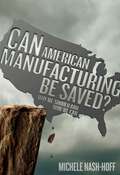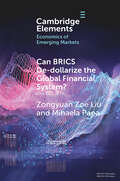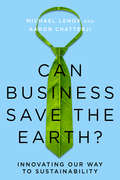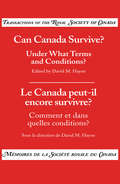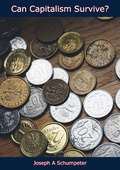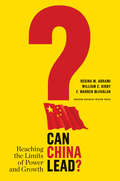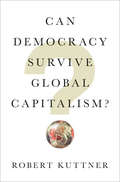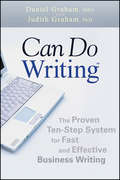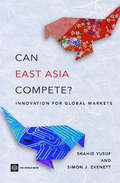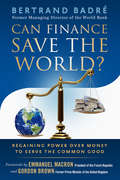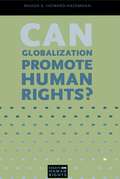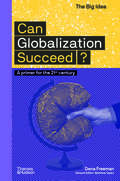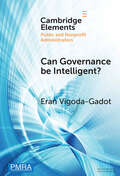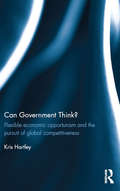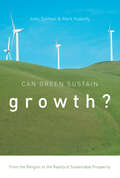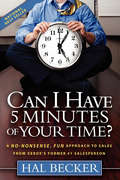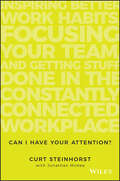- Table View
- List View
Can American Manufacturing Be Saved?: Why We Should and How We can
by Michele NashHoffThis book details how manufacturing developed in America through the industrial revolution and labor movement, analyzes the impact of outsourcing offshore and our nation&’s trade policies, looks at what various organizations are doing to try to help save American manufacturing, and what we can do as individuals from the perspective of business owners, employees, consumers, and voters to save American manufacturing. Author Michele NashHoff argues that we will not be able to save American manufacturing unless we develop a national manufacturing strategy and change our trade policies. She supports a &“Buy American&” policy, recommends preventing the sale of strategic U.S.owned companies to foreign companies, and enacting legislation to prevent corporations from avoiding income taxes by incorporating in a foreign country. The 2012 edition also describes the "Reshoring Initiative" and considers the reasons why companies are returning manufacturing back to America from Asia.
Can BRICS De-dollarize the Global Financial System? (Elements in the Economics of Emerging Markets)
by Zongyuan Zoe Liu Mihaela PapaExisting scholarship has not systematically examined BRICS (Brazil-Russia-India-China-South Africa) as a rising power de-dollarization coalition, despite the group developing multiple de-dollarization initiatives to reduce currency risk and bypass US sanctions. To fill this gap, this study develops a 'Pathways to De-dollarization' framework and applies it to analyze the institutional and market mechanisms that BRICS countries have created at the BRICS, sub-BRICS, and BRICS Plus levels. This framework identifies the leaders and followers of the BRICS de-dollarization coalition, assesses its robustness, and discerns how BRICS mobilizes other stakeholders. The authors employ process tracing, content analysis, semi-structured interviews, archival research, and statistical analysis of quantitative market data to analyze BRICS activities during 2009-2021. They find that BRICS' coalitional de-dollarization initiatives have established critical infrastructure for a prospective alternative nondollar global financial system. This title is also available as Open Access on Cambridge Core.
Can Blockchain Solve the Hold-up Problem in Contracts? (Elements in Law, Economics and Politics)
by Anup Malani Richard HoldenA vexing problem in contract law is modification. Two parties sign a contract but before they fully perform, they modify the contract. Should courts enforce the modified agreement? A private remedy is for the parties to write a contract that is robust to hold-up or that makes the facts relevant to modification verifiable. Provisions accomplishing these ends are renegotiation-design and revelation mechanisms. But implementing them requires commitment power. Conventional contract technologies to ensure commitment – liquidated damages – are disfavored by courts and themselves subject to renegotiation. Smart contracts written on blockchain ledgers offer a solution. We explain the basic economics and legal relevance of these technologies, and we argue that they can implement liquidated damages without courts. We address the hurdles courts may impose to use of smart contracts on blockchain and show that sophisticated parties' ex ante commitment to them may lead courts to allow their use as pre-commitment devices.
Can Bollywood Go Global?
by Geoffrey G. Jones Namrata Arora Alexis Lefort Surachita MishraConsiders the opportunities and challenges facing Indian film producers in accessing the global film market. Provides a historical context by describing the history of the cinema and the rise of Hollywood to global dominance by the 1920s. Although film industries continued elsewhere, including Great Britain and France, their products had limited international appeal. Discusses the rise of the Indian film industry and the industry structure. Bollywood films, produced in Mumbai (formerly Bombay), are the most well-known genre. They are typically long, melodramatic, and musical. There are also regional language films produced in Chennai, independent films, and "crossover" films, typically incorporating the experience of the Diaspora in Western countries. Bollywood films in particular have sold well in Southeast Asia and among the Indian Diaspora. Raises the issue whether Indian content films can compete with Hollywood in global markets and to what extent a change in content is necessary for this strategy to work.
Can Business Save the Earth?: Innovating Our Way to Sustainability
by Aaron Chatterji Michael LenoxIncreasingly, business leaders are tasked with developing new products, services, and business models that minimize environmental impact while driving economic growth. It's a tall order—and a call that is only getting louder. In Can Business Save the Earth?, Michael Lenox and Aaron Chatterji explain just how the private sector can help. Many believe that markets will inevitably demand sustainable practices and force them to emerge. But Lenox and Chatterji see it differently. Based on more than a decade of research and work with companies, they argue that a bright green future is only possible with dramatic innovation across multiple sectors at the same time. To achieve this, a broader ecosystem of players—including inventors, executives, customers, investors, activists, and governments—all must play a role. The book outlines how and the extent to which each group can serve as a driver of green growth. Then, Lenox and Chatterji identify where economic incentives currently exist, or could exist with institutional change, and ultimately address the larger question of how far well-coordinated efforts can take us in addressing the current environmental crisis.
Can Canada Survive?
by David M. HayneCanada is facing a critical period in its history. The Royal Society of Canada believed it had the responsibility to instigate both deep reflection and debate within the vast and diverse intellectual network it represents throughout Canada. In November 1996, the Fellows of all three Academies of the Society gathered to discuss perspectives on Canada's future.
Can Capitalism Survive?: Creative Destruction And The Future Of The Global Economy
by Joseph A Schumpeter"Can capitalism survive? No. I do not think it can." Thus opens Schumpeter's prologue to a section of his 1947 book, Capitalism, Socialism and Democracy. One might think, on the basis of the quote, that Schumpeter was a Marxist. But the analysis that led Schumpeter to his conclusion differed totally from Karl Marx's. Marx believed that capitalism would be destroyed by its enemies (the proletariat), whom capitalism had purportedly exploited, and he relished the prospect. Schumpeter believed that capitalism would be destroyed by its successes, that it would spawn a large intellectual class that made its living by attacking the very bourgeois system of private property and freedom so necessary for the intellectual class's existence. And unlike Marx, Schumpeter did not relish the destruction of capitalism. "If a doctor predicts that his patient will die presently," he wrote, "this does not mean that he desires it."-Print ed.“A highly sophisticated interpretation of entrepreneur capitalism, one that is filled with challenges for those who believe that monopolistic practices constitute a long-run sabotage of the functioning of the system, or that we have entered a new period of permanently depressed rates of private capital formation...Schumpeter’s work constitutes, as a whole, a bold attempt to integrate economic theory with economic history in a synthesis in terms of which the mechanics of the capitalistic process may be outlined with reference to historical time....There can be no question of its fundamental importance in throwing a clearer light upon the operations of an enterprise economy, and in setting up numerous objectives for future empirical research.”—The American Economic Review“If Nobel Prizes were posthumously awarded, Joseph Alois Schumpeter would certainly merit the honor, preferably with an oak leaf cluster. More than a generation after his death in 1950, he is universally esteemed a great economist.”—Robert Lekachman.
Can China Lead?
by William C. Kirby F. Warren Mcfarlan Regina M. AbramiIt's time to rethink the way we think about China.In this thought-provoking book, noted China experts from Harvard Business School and the Wharton School assert that while China has experienced remarkable economic growth in recent decades (nearly 10 percent for more than thirty years), it now faces major challenges-tests that could shift the country's political and economic trajectory.A lack of accountability, transparency, and ease of operating in China-combined with growing evidence of high-level corruption-has made domestic and foreign businesspeople increasingly wary of the "China model." These issues have deep roots in Chinese history and the country's political system.Regina M. Abrami of the Wharton School and William C. Kirby and F. Warren McFarlan of Harvard Business School contend that the country's dynamic private sector could be a source of sustainable growth, but it is constrained by political favoritism toward state-owned corporations. Disruptive innovation, research, and development are limited by concerns about intellectual property protection. Most significant of all is the question of China's political future: does a system that has overseen dramatic transformations in recent years now have the capacity to transform itself?Based on a new and popular course taught by the authors at Harvard Business School, this book draws on more than thirty Harvard Business School case studies on Chinese and foreign companies doing business in the region, including Sealed Air, China Merchants Bank, China Mobile, Wanxiang Group, Microsoft, UFIDA, and others.Can China Lead? asserts that China is at an inflection point that cannot be ignored. An understanding of the forces that continue to shape its business landscape is crucial to establishing-and maintaining-a successful enterprise in China.
Can Debt Relief Boost Growth in Poor Countries?
by Benedict Clements Rina Bhattacharya Toan Quoc NguyenThe Heavily Indebted Poor Countries (HIPC) Initiative, launched in 1999 by the IMF and the World Bank, was the first coordinated effort by the international financial community to reduce the foreign debt of the world's poorest countries. It was based on the theory that economic growth in heavily indebted poor countries was being stifled by heavy debt burdens, making it virtually impossible for these countries to escape poverty. However, most of the empirical research on the effects of debt on growth has lumped together a diverse group of countries, and the literature on the countries' impact of debt on poor is scant. This pamphlet presents the findings of the authors' empirical research into the subject, analyzing the channels through which debt affects growth in low-income countries.
Can Democracy Survive Global Capitalism?
by Robert Kuttner<P>One of our leading social critics recounts capitalism’s finest hour, and shows us how we might achieve it once again. <P>In the past few decades, the wages of most workers have stagnated, even as productivity increased. Social supports have been cut, while corporations have achieved record profits. Downward mobility has produced political backlash. <P><P>What is going on? Can Democracy Survive Global Capitalism? argues that neither trade nor immigration nor technological change is responsible for the harm to workers’ prospects. According to Robert Kuttner, global capitalism is to blame. By limiting workers’ rights, liberating bankers, allowing corporations to evade taxation, and preventing nations from assuring economic security, raw capitalism strikes at the very foundation of a healthy democracy. <P>The resurgence of predatory capitalism was not inevitable. After the Great Depression, the U.S. government harnessed capitalism to democracy. Under Roosevelt’s New Deal, labor unions were legalized, and capital regulated. Well into the 1950s and ’60s, the Western world combined a thriving economy with a secure and growing middle class. <P>Beginning in the 1970s, as deregulated capitalism regained the upper hand, elites began to dominate politics once again; policy reversals followed. The inequality and instability that ensued would eventually, in 2016, cause disillusioned voters to support far-right faux populism. Is today’s poisonous alliance of reckless finance and ultranationalism inevitable? Or can we find the political will to make capitalism serve democracy, and not the other way around? Charting a plan for bold action based on political precedent, Can Democracy Survive Global Capitalism? is essential reading for anyone eager to reverse the decline of democracy in the West.
Can Do Writing: The Proven Ten-Step System for Fast and Effective Business Writing
by Daniel Graham Judith GrahamA simple, ten-step system for mastering the art of effective, persuasive business or technical writing "The Grahams' system is the best way to transform data and ideas into meaningful information necessary to make profitable decisions. Their system works every time." —Steven Laposa, PhD, MBA, Loveland Commercial Endowed Chair in Real Estate, Colorado State University "The Grahams' straightforward program helps my teams create clear and concise reports, letters, and other documents with minimal effort. I want this program to become the standard for my teams." —Bill Walter, Senior Vice President, Government and Infrastructure Division, KBR "The Can Do Writing system made my career! I used it to write a winning business plan and proposal, and now I use it every day for all communications. Can Do Writing provides valuable insights into business and management as well as writing techniques." —Christian Robey, President, DC Progress You may be an expert at what you do, but if you can't communicate effectively in writing it may not matter. For scientists, businesspeople, and professionals in fields from engineering to public relations, the art of writing well can be a vital key to professional success. Luckily, you don't need an English degree to produce top-class writing. If you're one of the millions of people who have to write clear, persuasive, understandable documents for your job, Can Do Writing is for you. Whether you're writing a business plan, a scientific paper, a press release, or anything else, this simple, straightforward guide will show you how to do it quickly, with style and confidence. You'll learn how to: Understand your audience and subject matter Develop a simple, five-part purpose statement to keep you on track Organize your main points into a coherent, sensible order Edit your work for clarity, coherence, organization, and logic Economize your words to craft a concise, powerful document Make your documents easily readable for any audience
Can East Asia Compete? Innovation For Global Markets
by Shahid Yusuf Simon J. EvenettEast Asian economies of the 1980s and much of the 1990s were among the most competitive exporters of manufactured products and were also able to sustain growth rates far higher than those of other countries, developing or industrial. However, the economic crisis of 1997-98 impacted the economies of these countries. Although recovery began fairly quickly in some countries, others have yet to regain their growth momentum. 'Can East Asia Compete?' looks at whether or not East Asia can restore its near magical performance, or is its competitive strength beginning to wane. This volume argues that East Asian countries have far from exhausted their growth potential. However, future competitiveness will depend on much greater innovative capability in manufacturing and services, innovativeness that is grounded in stronger institutions, improved macroeconomic policies, and closer regional coordination. 'Can East Asia Compete?' clearly summarizes the issues currently being debated and provides guidance to East Asian economies on how to deal with the policy concerns that lie ahead.
Can Finance Save the World?: Regaining Power over Money to Serve the Common Good
by Bertrand BadréCan Finance Save the World?Regaining Power over Money to Serve the Common GoodJust as Thomas Piketty offered a sweeping critique and progressive reassessment of capitalism, former World Bank Group chief financial officer Bertrand Badré looks at the destructive role finance played in the global economic crisis of 2007–2008 and offers a bold prescription for making it a force for good. Badré says that finance is inherently neither good nor bad. It's just a tool—the most powerful tool on earth. Used correctly, it can be at the heart of the way we address many of the world's biggest problems, ranging from climate change to the eradication of poverty to building much-needed infrastructure. He describes innovations in financial tools and approaches that are already happening around the world and looks at the role regulation can play in channeling the power of finance in a positive direction. He details options for strengthening international cooperation for financial stability and prosperity and overcoming the blinkered nationalism currently on the rise. And he tells what is working and what needs to change in financing the sustainable development of the world. This book is rich with practical examples, some developed by Badré himself. For instance, he describes how at the World Bank he devised an innovative way to use insurance, a financial tool rarely considered in international development, to buttress fragile emerging economies against natural disasters and pandemics. Initiatives like these show that, as Badré writes, "when controlled and used intelligently, with benevolence and inventiveness, finance can accomplish great things."
Can Florida Orange Growers Survive Globalization?
by Ray A. Goldberg Hal HoganFlorida Citrus Department has to deal with increasing competition from Brazil. What position should the industry take on its existing tariff? Who benefits? Who loses?
Can Globalization Promote Human Rights? (Essays on Human Rights #3)
by Rhoda E. Howard-HassmannGlobalization has affected everyone’s lives, and the reactions to it have been mixed. Legal scholars and political scientists tend to emphasize its harmful aspects, while economists tend to emphasize its benefits. Those concerned about human rights have more often been among the critics than among the supporters of globalization. In Can Globalization Promote Human Rights? Rhoda Howard-Hassmann presents a balanced account of the negative and positive features of globalization in relation to human rights, in both their economic and civil/political dimensions. On the positive side, she draws on substantial empirical work to show that globalization has significantly reduced world poverty levels, even while, on the negative side, it has exacerbated economic inequality across and within countries. Ultimately, she argues, social action and political decision making will determine whether the positive effects of globalization outweigh the negatives. And, in contrast to those who prefer either schemes for redistributing wealth on moral grounds or authoritarian socialist approaches, she makes the case for social democracy as the best political system for the protection of all human rights, civil and political as well as economic.
Can Globalization Succeed?: A Primer For The 21st Century (The Big Idea Series #0)
by Dena FreemanA lively examination of the effects of neoliberal globalization, its ability to adapt, and its potential to survive the antiglobalization and nationalist backlash. The expansion of capitalism and neoliberal ideologies have delivered economic integration between countries and brought global inter-connectedness to individuals. So why do so many people now feel that they are citizens of nowhere, disparaged by the cosmopolitan elites? Has democracy and the power of nation states been irredeemably weakened by unfettered global finance, opaque forms of global governance, and the power of transnational corporations? Can the huge rise in social and economic inequality be reversed? Can diverse cultural expression be maintained in a globalizing world? In the context of the current nationalist backlash and the momentous impacts of the COVID-19 pandemic, this thought-provoking volume considers whether globalization is dead or whether it will survive, and perhaps transform. Written in a clear and engaging style, the volume traces the development of economic globalization starting from the first wave of colonialization in the 15th century, through the first period of globalization at the end of the 19th century, and up to the contemporary period of globalization that started in the 1980s and appears today to be teetering on the brink of collapse. It explores the impacts of globalization on today’s world, from global supply chains and tax havens to rising economic inequality, climate change and pandemics, and assesses the different impacts on rich and poor countries, and on the rich and poor within countries. It then reviews the growing anti-globalization sentiment, starting from the anti-IMF protests that raged through developing countries in the 1980s and 1990s, to the emergence of the transnational anti-globalization movement of the 2000s, to more recent uprisings such as the Arab Spring, The Occupy Movement, the Gilets Jaunes, and to the current populist nationalist backlash led by President Trump and embodied in the 2016 Brexit vote. Sensing that globalization has reached a tipping point, the book considers a range of possible scenarios for the future world order, including nationalism, authoritarianism and democratic globalism. Finally, it explores whether globalization can be democratized in a world in which effective and inclusive global governance is crucial to solving global problems, such as tackling climate change, controlling global pandemics and upholding universal human rights.
Can Goodr Fight Food Insecurity at Scale?
by Daniel J. Isenberg William R. KerrJasmine Crowe founded Goodr to redirect food waste to people in need. Now a profitable enterprise, she's searching for Series A funding and encountering pushback. Scaling and contract concerns are also at the forefront of her mind, but so are her values. Feeding hungry people is at the core of her mission, but potential backers tell her the company is better off without doing so. She thinks, too, about how her race may be holding her back from funding opportunities.
Can Governance be Intelligent?: An Interdisciplinary Approach and Evolutionary Modelling for Intelligent Governance in the Digital Age (Elements in Public and Nonprofit Administration)
by Eran Vigoda-GadotIntelligence is a concept that occurs in multiple contexts and has various meanings. It refers to the ability of human beings and other entities to think and understand the world around us. It represents a set of skills directed at problem-solving and targeted at producing effective results. Thus, intelligence and governance are an odd couple. We expect governments and other governing institutions to operate in an intelligent manner, but too frequently we criticize their understanding of serious public problems, their decisions, behaviors, managerial skills, ability to solve urgent problems, and overall governability wisdom. This manuscript deals with such questions using interdisciplinary insights (i.e., psychological, social, institutional, biological, technological) on intelligence and integrating it with knowledge in governance, administration, and management in public and non-profit sectors. We propose the IntelliGov framework, that may extend both our theoretical, methodological, analytical, and applied understanding of intelligent governance in the digital age.
Can Government Combat Obesity Without Becoming a "Nanny State"?: Personal Freedom and Personal Well-Being Don't Have to Be Mutually Exclusive
by Peter A. UbelPolitical extremists of all persuasions are often paranoid about the slippery slope, worrying that any tiny concessions they make will lead to complete absolution of their position. Free market enthusiasts would rather have a fat and free citizenry, for instance, than consider perceived interventions into personal liberties, even if those interventions are made on behalf of the health of the general public. In this chapter, behavioral scientist and physician Peter Ubel considers whether or not a middle ground exists in the argument between liberty and personal well-being. He explores what governments can do to combat obesity, from the win-win solutions promoted by soft paternalists, to more intrusive alternatives. This chapter is excerpted from "Free Market Madness: Why Human Nature Is at Odds with Economics--and Why It Matters."
Can Government Think?: Flexible economic opportunism and the pursuit of global competitiveness
by Kris HartleyClimate change, financial crises, and other issues of global scale no longer concern only the developed world. The binding power of globalization has placed these challenges at the doorstep of almost every country, testing the evolutionary capacity of monolithic governance systems bound by institutional legacy and administrative stagnation. This book locates the concept of adaptive governance, used primarily in environmental management, within the context of economic policy. Introducing flexible economic opportunism, it argues that a particular style of institutional and administrative versatility enables innovative, evidence-based policy development. This book mines institutional economics, public administration, and research theory and practice for complementary elements that can inform an emerging governance paradigm based on flexible economic opportunism. Through an eclectic suite of cases from the developing and developed worlds including Asia and North America, this book reveals how patterns of institutional and administrative change impact the efficacy of public policy. Flexibility may be this century’s most critical dimension of global competitiveness, and systems configured to quickly and comprehensively capture economic opportunities will win the marketplace of development ideas. This book advances that discussion.
Can Green Sustain Growth?: From the Religion to the Reality of Sustainable Prosperity
by John Zysman Mark HubertyGreen growth has proven to be politically popular, but economically elusive. Can Green Sustain Growth? asks how we can move from theoretical support to implementation, and argues that this leap will require radical experimentation. But systemic change is costly, and a sweeping shift cannot be accomplished without political support, not to mention large-scale cooperation between business and government. Insightful and timely, this book brings together eight original, international case studies to consider what we can learn from the implementation of green growth strategies to date. This analysis reveals that coalitions for green experimentation emerge and survive when they link climate solutions to specific problems with near-term benefits that appeal to both environmental and industrial interests. Based on these findings, the volume delivers concrete policy recommendations for the next steps in the necessary shift towards sustainable prosperity.
Can He Walk the Walk?: The Outlook for the Bernanke Fed
by Ethan S. HarrisWhat is the outlook for the Fed? In this chapter, leading economist Ethan Harris looks into the future of economic policy under Ben Bernanke, offering some expert analysis and informed predictions of how the economy will fare in the years ahead.
Can I Have 5 Minutes of Your Time?: A No-Nonsense, Fun Approach to Sales from Xerox's Former #1 Salesperson
by Hal BeckerCan I Have 5 Minutes of Your Time? is one of the best selling books on sales to come along in over 20 years. The ideas and concepts inside have been used by tens of thousands of people to increase their sales performance.
Can I Have Your Attention?: Inspiring Better Work Habits, Focusing Your Team, and Getting Stuff Done in the Constantly Connected Workplace
by Jonathan Mckee Curt Steinhorst"A must read for anyone in the business of leading others."Ken May, CEO of Top Golf; former CEO of Fedex"If you want your team to stay focused, you will want to read Can I Have Your Attention?"Chester Elton, New York Times Best-Selling author of All In, The Carrot Principle and What Motivates MeInspire better work habits. Focus your team. Get stuff done in the constantly connected workplace.As our workloads expand, attention has never been more valuable. Or more difficult to keep.In Can I Have your Attention?, Curt Steinhorst shows business leaders how to cut through the noise and get their employees back to work. Curt has spent years helping Fortune 500 companies overcome distraction and achieve focus. With technology creating endless opportunites to "improve productivity", people spend so much time responding to the interruptions that they've lost the ability to focus and do their jobs. Yet, the potential for harnessing the power of your team's attention has never been greater--if you can capture it.You'll learn how to: Implement a comprehensive organizational strategy to increase focus and overcome digital distraction. Take back control of the technology in your organization and life. Establish a Communication Compact, defining how, when, and why your team will communicate with each other. Create a "vault" to increase productivity, decrease stress, and boost your creativity. Free yourself and your employees from the never-ending flood of emails and messages. Achieve unmatched focus in the age of distraction. The smartphone isn't going away. Learn the simple rules and guidelines that will improve focus and create the mental space needed for your people to work to their full potential.
Can I Step Back from My Start-Up?
by David R. Dixon Candace Leak Todd OlsonCase Study - Elena Pelc is the founder and CEO of 2 Proud Pups, a maker of all-natural dog care products. Sales are good, but revenues have plateaued at about $1 million annually. Plus she's pregnant with her first child. She must decide whether to sell the company--which would give her more time with her family and help her start-up grow--or hire a new CEO and continue to exert some control over its future. With commentary from Candace Leak, the founder and CEO of Loanables.com, and Todd Olson, a cofounder and the CEO of Pendo.
